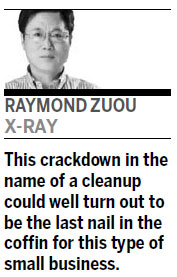No standing in the way of 'progress'
Updated: 2014-08-16 08:33
By Raymond Zhou(China Daily)
|
||||||||
Even without such overzealous meddling from city managers, Chinese people's favorite spots for obtaining news in good old-fashioned print are fast losing ground to the corrosive power of digital technology.
About a decade ago, newsstands in Chinese cities were doing brisk business and each could support a family. Nowadays, sales have fallen so much that the stands either have to sell other merchandise or close entirely.
This crackdown in the name of a cleanup could well turn out to be the last nail in the coffin for this type of small business.
As a management tactic, this is very much in line with how Chinese cities deal with all kind of street vendors. From the perspective of city officials, street stalls selling trinkets, fruit or snacks constitute a major eyesore. They block traffic and litter abounds. So, they are to be kicked out by chengguan, literally "city management staff", a quasi-police force whose measures have been strongly criticized by the public - to the point that the word chengguan has become a catchall for hooligan-like people.
If you tour Hong Kong or Taipei, you'll come to the conclusion that the Chinese penchant for hustle and bustle does not have to come at the expense of blocked traffic or littered sidewalks.
Yes, there should be rules, but these rules should not be made to make life easy for city officials, but rather, easy for the public.
The operating hours and locations of these street stands can be calibrated to accommodate the neighborhood, the clientele as well as the businesses. Rules must be made by taking into account the needs and input of all sides affected by these businesses and once agreed, every party must abide by them.
Most commentators defend the newsstand owners from a legal or cultural distribution point of view. These are all valid, but the real danger lies in the singular take on culture and gentrification.
It doesn't matter whether such stands sell soup or soft drinks or newspapers, they exist because there is a real demand.
When so many prefer to make their purchases at street stands rather than in shiny shopping malls, it forms a lifestyle that is part of our cultural fabric.
Bygone era
In the eyes of some city managers, such booths are a reminder of a bygone era when poverty forced buyers and sellers onto the street.
The officials wanted to erase the humiliation by driving businesses into glittering high-rises. But in their eagerness for modernization, they forgot that some businesses can never afford to rent space in a mall, and that some customers prefer to buy certain things at a street corner.
This is not a hypothesis. A walk in New York or London or Hong Kong will quickly confirm the necessity of this much more primitive, down-to-earth way of conducting business.
Suffice to say, malls and boutiques have not supplanted the old ways, even though they have become the mainstream mode of shopping.

 Music at her fingers
Music at her fingers
 Across America Over the Week (Jan 16 - Jan 22)
Across America Over the Week (Jan 16 - Jan 22)
 Spend Chinese New Year in style
Spend Chinese New Year in style
 Ili river valley becomes a popular destination for swans
Ili river valley becomes a popular destination for swans
 Philip Ma: from scientist to businessman
Philip Ma: from scientist to businessman
 Birmingham's Spotlight on China dinner
Birmingham's Spotlight on China dinner
 How to distinguish doucai, wucai, Famille-rose and enamel porcelain
How to distinguish doucai, wucai, Famille-rose and enamel porcelain
 Xinjiang lake in bumper fishing season
Xinjiang lake in bumper fishing season
Most Viewed
Editor's Picks

|

|

|

|

|

|
Today's Top News
Houston's SW Chinatown
China to focus on reforms, opening of capital market
Slowdown brings new risks to banks
Trade group calls for BIT
Market status for China is 'political' issue
Birmingham's Spotlight on China dinner
Bank takes renminbi-clearing seriously
Traditional Garb
US Weekly

|

|








